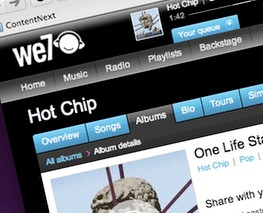
Do users really want unlimited digital options? We7, a British online music service part-funded by Peter Gabriel, is making a strategy switch in which it will downplay its existing on-demand service in favour of a new, Pandora-style personalised radio offering that offers less choice.
“I thought the ultimate music service was one where you get to choose,” We7 CEO Steve Purdham told paidContent:UK in this interview over Skype. “Actually, users are saying, ‘I can’t be bothered, just entertain me’.”
It’s the latest focus for the company, which launched in 2007 with ads embedded in free music downloads. It later moved to free, ad-supported web streaming and recently added ad-free subscription options to try offsetting royalty outgoings.
We7 soft-launched the “radio” feature, with which users can select their first song but after which the site plays related material, in January. “By September, more than 55 percent of tracks were being accessed through radio rather than on-demand,” Purdham says. “This is a massive hint on how people want to listen to music. Put simply, it states ‘entertain me but let me have control when I want it’.”
We7, which has three million monthly uniques, isn’t switching off its on-demand service, which has only managed attract paying customers in the “low thousands” since introducing ad-free subs in January. But it will make the radio service, now dubbed “Radio Plus“, the “entry point” instead.
And, though it this year said ad income had finally started paying for its royalty outgoings, 2009 losses grew to £3.66 million. Aside from courting this supposedly recently-discovered user preference, however, the switch could make running costs cheaper, because interactive radio royalties are three times cheaper than on-demand streaming, Purdham said.
Most online music services have complained that online royalty rates hamper their success. Last.fm already turned off its on-demand offering in April, also likely to cut costs.
This move is also an effort to get off Spotify’s lawn. Though the Anglo-Swedish service operates the same kind of radio feature, its large on-demand catalogue is its trump suit and it’s trying to replace iTunes as users’ library point. Purdham says Spotify’s popularity in the on-demand library space was “one facet” of We7’s radio move.
But We7 is now embracing a personalised radio model that is still operated popularly by Last.fm and by Pandora in the U.S.. Purdham maintains there’s room for Last.fm and We7 to co-exist in that area.
As well as Gabriel, the company counts Purdham, Eden Venture and Spark Ventures as investors.